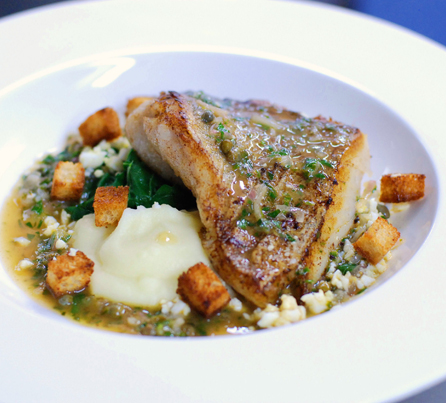Fillet of Pollock Grenobloise with Pommes Puree
From Raymond Blanc's Kitchen Secrets (BBC): http://www.raymondblanc.com/
The colour of the fish will determine the taste and also the aesthetics of this dish. A French potato purée is so different from an English mash. The best potatoes for pommes purées are Estima, Maris Piper or King Edward. Serves 4
For the Pollock
30g sliced white bread, cut into 1cm/½in cubes
4 x 180g/6oz pollock fillets, about 3cm/1¼in thick,
skin on, bones removed
4 pinches sea salt
1 pinch freshly ground white pepper
60g/2½oz unsalted butter
50ml/2fl oz hot brown chicken stock
50ml/2fl oz hot water
30g/1¼oz capers, drained, rinsed
½ lemon, peeled, segmented, roughly chopped
30g/1¼oz shallot, peeled and finely chopped
30g/1¼oz caper berries
10g/½oz chopped fresh flatleaf parsley
10g/½oz chopped fresh chervil
For the pomme purées
1kg/1lb 2oz potatoes, such as Eestima, Maris Piper or King Eedwards, peeled, cut into quarters
2 litres/3 pints 10½fl oz cold water
200ml/7fl oz full-fat milk
60g/2½oz unsalted butter
2 pinches sea salt
2 pinches freshly ground white pepper
For the pollock
Preheat the oven to its highest setting (250º-300º if possible).
Scatter the bread cubes onto a large baking tray and dry roast in the oven for 3-4 minutes, or until crisp and golden-brown. Remove the croûtons from the oven and set aside.
Reduce the oven temperature to 200C/400F/Gas 6.
Pat the pollock fillets dry using kitchen paper, then season all over, to taste, with the salt and freshly ground white pepper.
Heat the butter in a frying pan over a medium heat. When the butter is foaming and starting to brown, add the pollock fillets, skin-sides facing upwards, and fry for 4-5 minutes, or until two thirds of each fish fillet has turned opaque.
Using a fish slice, carefully turn each pollock fillet over and continue to cook for a further 2-3 minutes.
Transfer the fish fillets to a cold ovenproof frying pan and roast in the oven for 3-4 minutes, or until just cooked through, then set the fish fillets aside on a warm plate to rest.
Return the frying pan used to cook the pollock to a high heat. Add the brown chicken stock and water and bring to the boil.
For the pommes purées
Bring the potatoes to the boil in a large pan of cold, salted water. Reduce the heat until the water is just simmering and cook for 25-30 minutes, or until the potatoes are soft.
Drain well in a colander, setting the drained potatoes aside for 2-3 minutes to drive off the excess steam.
Mash the potatoes until smooth using a potato ricer or masher, or for a finer texture put them through a mouli. Return the potato purée to a saucepan, add the milk and beat well until combined.
Beat in the butter until the mixture is fluffy and forms firm peaks, then season, to taste, with salt and freshly ground white pepper. Keep warm.
Add the capers, chopped lemon segments, shallots, caper berries and two-thirds of each of the herbs. Stir well and continue to cook for 1-2 minutes, or until warmed through. Season, to taste, with salt and freshly ground white pepper.
To serve, spoon the pommes purées into the centre of each of 4 1 serving plates. Place one pollock fillet on top of each portion. Spoon over the caper and lemon sauce, then sprinkle over the croûtons and the remaining herbs..
Chef’s Notes: ( *)
*1 The flesh and skin of the fish must be dry otherwise the fish will boil in the liquid present as opposed to caramelising it.
*2 The success of this dish is in the simple technique of pan frying; the ability to carefully regulate the temperature to achieve the right degree of colour. Iif the butter becomes too hot, it will burn, be bitter and indigestible, however if the butter is not hot enough, the fish will not caramelise.


